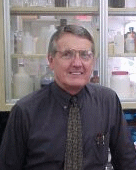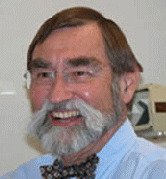The following faculty members are faculty or continuing professionals who retired in good standing after 15 years or more, and who have been awarded Emeritus status by the President of the University of Arizona. Please click on the name of each member to learn more about them.

Program Affiliations: Animal Sciences, Nutritional Sciences, Physiological Sciences
Website and Publications:
Research Interests: Muscle Biology, Animal Sciences, Skeletal Muscle
- The focal point of research in this laboratory is the growth and repair of skeletal muscle in domestic animals and humans. The key player in both of these processes is the satellite cell. Satellite cells are muscle stem cells that are generally found in a quiescent, or dormant, state in close association with muscle fibers. Although sparsely distributed in postnatal muscle, they play an important role in regulating muscle growth by dividing and fusing with existing muscle fibers. The result is a net increase in the number of muscle fiber nuclei and hence, an increase in the growth potential of the fiber. In injured muscle, satellite cells are stimulated to divide and form new fibers that replace damaged muscle fibers. Consequently, the rate and efficiency of muscle growth and repair are dependent on the activity of satellite cells, and therefore, satellite cell function is relevant to muscle growth in domestic animals, to human muscle disease and injury and to problems associated with aging
- Research goals in this laboratory have been to identify the hormones and growth factors responsible for satellite cells activation from the quiescent state, division and fiber formation. This problem is being approached by integrating experiments at the cellular, tissue, and whole animal level.

Program Affiliations: Cell Biology and Anatomy, Cellular and Molecular Medicine, Bio5 Institute, Physiological Sciences
Website and Publications:
Contact Information: 520-621-7201, pba@arizona.edu
Research Interests: Cardiovascular Disease: Embryogenesis, Tyrosine Kinases, Hepatocytes
- Research in our laboratory is focused on understanding the molecular regulation of early developmental processes in vertebrate embryos. We primarily use the chicken embryo as a model organism, and approach research questions from the dual perspective of how individual molecules function and how their functions can be integrated into network models. One present research emphasis is concerned with understanding epithelial to mesenchymal transition (EMT) during avian gastrulation. Microarray studies have shown that more than 1800 genes are upregulated in the epiblast adjacent to the primitive streak. Many of these genes are regulated by FGF signaling, including members of several other signaling pathways and at least thirty differentially expressed transcription factors. Fgf signaling therefore appears to be a key upstream regulator of EMT. Studies are investigating the intracellular signaling pathways downstream of Fgf receptor activation, including the MAPK, PI3K and AKT pathways. The MAPK pathway in particular directly regulates downstream gene transcription via activation of several transcription factors, including members of the Ets and T Box families. Studies are investigating downstream transcriptional targets of these factors.
- Another long standing research interest in the lab is the mechanisms controlling early stages of cardiac myogenesis, from the emergence of premyocardial cells during gastrulation to formation of the primitive heart tube. Bmp and Fgf signaling are well known activators of genes in the cardiogenic pathway, however relatively few direct transcriptional targets of these signaling pathways have been identified. By combining classical experimental embryological approaches with genome wide microarray analyses, we are working to generate a large-scale model of cardiac myogenesis.
- These studies are integrating with a parallel effort to generate broad approaches for developing network models of biological processes in vertebrates. This involves high throughput in situ hybridization and microarray gene expression analysis and large scale-collation of published information to generate preliminary network models. Models are then tested through parameter space using software tools such as Ingeneue. Results are integrated with an artificial intelligence software environment that evaluates results and can suggest network modifications for retesting. Promising candidate network models are then tested in vivo. Through successive reiterations between computational network modeling and model testing in vivo, progressively more representative networks can be generated. Initial efforts are focused on modeling EMT during gastrulation and cardiac myogenesis.
- Our laboratory also hosts the GEISHA in situ hybridization database and website (http://geisha.arizona.edu (link is external)). The GEISHA project (gallus expression in situ hybridization analysis) began in 1998 to investigate using high throughput whole mount in situ hybridization to identify novel, differentially expressed genes in chicken embryos. An initial expression screen of approximately 900 genes demonstrated feasibility of the approach, and also highlighted the need for a centralized repository of in situ hybridization expression data. Funding was eventually obtained for this purpose. The goals of the GEISHA project are to obtain whole mount in situ hybridization expression information for all differentially expressed genes in the chicken embryo between HH stages 1-25, to integrate expression data with the chicken genome browsers, and to offer this information through a user-friendly graphical user interface

Program Affiliations: Physiology, Bio5 Institute, Physiological Sciences
Website and Publications:
Research Interests: Comparative Renal Physiology
- Comparative renal physiology and morphology; regulation of individual nephron filtration rates and renal blood flow.

Program Affiliations: Physiology, Bio5 Institute, Physiological Sciences
Website and Publications:
Research Interests: Renal Physiology, Cation and Anion Transport
- Relationship of structural organization of thin limbs of Henle's loops to function in mammalian renal inner medulla.
- Recycling of amino acids and organic osmolytes between Henle's loops and vasa recta in mammalian renal inner medulla.
- Regulation of intracellular pH in thin limbs of Henle's loops in mammalian renal inner medulla.
- Cellular and molecular mechanisms and regulation of organic anion and cation transport in renal proximal tubules of mammals, birds, and reptiles.
Program Affiliations: Physiology, Biochemistry and Molecular & Cellular Biology, Nutritional Sciences, Bio5 Institute, Physiological Sciences
Website and Publications: Sarver Heart Center Profile
Research Interests: Diabetes: Regulation of Glucose Transport, Insulin
- Regulation of glucose transport in muscle by insulin and contractions
- Role of glycogen synthase kinase-3 in the etiology of skeletal muscle insulin resistance
- Role of oxidative stress in the development of defective insulin signaling and glucose
transport in skeletal muscle - Pharmaceutical and nutriceutical interventions for the treatment of insulin resistance of
skeletal muscle glucose transport - Adaptive responses of carbohydrate and protein metabolism in muscle to exercise,
simulated weightlessness, and denervation

Program Affiliations: Physiology, Pharmacology & Toxicology, Animal Sciences, Physiological Sciences
Website and Publications:
Research Interests: Ovarian physiology/toxicology, menopause
- Elucidating signaling pathways that regulate cell death by apoptosis
- Establishing mechanisms of ovotoxicity caused by environmental chemicals
- Developing models that alter the rate of atresia in ovarian follicles
- Characterizing a chemically-induced follicle-depleted ovary-intact rodent for peri- and post- menopause

Program Affiliations: Arizona Cancer Center, Physiological Sciences
Website and Publications: Cancer Center Profile
Research Interests: Cancer: Therapeutic Development

Program Affiliations: Department of Surgery, Biomedical Engineering, Medical Pharmacology, Bio5 Institute, Physiological Sciences
Website and Publications: Department of Surgery Faculty Page
Research Interests: Hypertension: Immune System, Left Ventricular Function
- The goal of my research is to define the relationship between the immune system and the left ventricular function. Recently, research activities have focused on the role of the immune system and its regulation of gene expression and enzyme function in cardiomyopathies. The models of cardiomyopathy being studied are secondary to HIV infection, infarction, rejection and aging. The hypothesis of these studies is that myocardial dysfunction secondary to an immune-cytokine event is mediated by increased iNOS and NO activity. In support of these studies, we have developed a system that can quantify the ventricular mechanics of the murine heart in vivo.

Program Affiliations: Neuroscience, Bio5 Institute, Physiological Sciences
Website and Publications:
Research Interests: Neuroscience: Neuromuscular Systems, Steroid Hormones, Electrophysiology
- People in the Levine laboratory share a common interest in the function and development of neuromuscular systems. Neuromuscular systems, including the motoneurons that control movement and the muscles that they innervate, are modified throughout life by many factors including hormones, learning, training, and aging. We are using the molecular and genetic power of Drosophila, and mammalian systems to explore the neural circuits that control movement and the mechanisms through which steroid hormones regulate their function and postembryonic modification. Using techniques such as intracellular and whole-cell patch recording, dye injection, confocal microscopy and cell culture we are describing the biophysical properties, dendritic anatomy, and synaptic connections of individual motoneurons. Recent experiments explore the role of calcium and potassium currents in determining the functional properties of identified motoneurons that participate in locomotor and respiratory behavior

Program Affiliations: Pharmacology, Bio5 Institute, Physiological Sciences
Website and Publications:
Contact Information: (520) 626-0742, pmantyh@arizona.edu
Research Interests: Neuroscience: Pharmacology/Pain Research
- Develop clinically relevant models of malignant and non-malignant skeletal pain
- Mechanism-based understanding of the factors driving skeletal pain
- Evaluation of the effects that therapies have on pain and disease progression
- Regulation of bone remodeling by nervous system
- Stem cells and bone health

